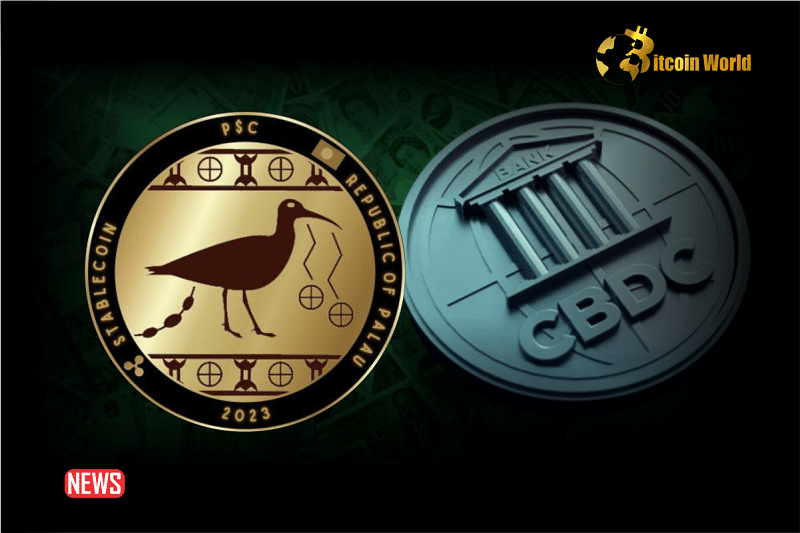In a move signaling a significant leap into the future of finance, the Republic of Palau has released a detailed report outlining the first phase of its Central Bank Digital Currency (CBDC) pilot program. This isn’t just another pilot program; Palau partnered with Ripple, a major player in the crypto and blockchain space, leveraging their CBDC platform and expertise. Curious to know how this tropical island nation is venturing into the digital currency realm? Let’s dive into the key findings of this groundbreaking initiative.
Palau’s CBDC Experiment: What’s the Big Deal?
Palau, known for its stunning natural beauty and progressive outlook, isn’t just sitting on the sidelines of the digital revolution. Recognizing the potential of digital currencies to enhance financial accessibility and efficiency, the nation embarked on a pilot CBDC program in collaboration with Ripple. Why Ripple, you might ask? Ripple’s established expertise in blockchain technology and cross-border payments makes them a fitting partner for a nation exploring the benefits of a digital currency. This pilot program, running from June to September 2023, aimed to test the waters and understand the real-world implications of a CBDC in Palau.
How Did the Palau CBDC Pilot Program Work?
Imagine a small-scale, real-world test run for digital money. That’s essentially what Palau did. Here’s a breakdown of how the pilot program was structured:
- Partnership with Ripple: Palau teamed up with Ripple’s CBDC and Central Bank Engagements teams, utilizing Ripple’s CBDC platform as the technical backbone.
- Limited Participation: The program involved up to 200 volunteer employees from Palau’s government executive branch, with 168 actually participating.
- Local Retail Focus: Participants could use the digital currency to make purchases at select local retailers.
- Controlled Circulation: A maximum of $20,000 worth of digital currency was issued.
- XRP Ledger Foundation: The digital tokens were issued on the XRP Ledger, a blockchain known for its speed and efficiency.
- USD Backing: These digital tokens were fully collateralized with U.S. dollar deposits held in a U.S. FDIC-insured bank, ensuring stability and trust.
What Did Palau Hope to Achieve?
The goals of this pilot program were multifaceted, aiming to explore various aspects of CBDC implementation. Palau wasn’t just experimenting for the sake of it; they had clear objectives in mind:
- Real-World Testing: To assess the practical application and user experience of a CBDC in a controlled environment.
- Data Collection: To gather valuable data on user behavior, transaction efficiency, and potential challenges.
- Stakeholder Feedback: To gauge the acceptance and satisfaction levels among both users (government employees) and merchants (local retailers).
- Understanding Infrastructure Needs: To identify the necessary infrastructure and technological requirements for a potential nationwide CBDC rollout.
The Verdict: Was Palau’s CBDC Pilot a Success?
According to Palau’s Ministry of Finance, the first phase of the program was a “success among both volunteers and retailers.” But what does the data actually say? Let’s look at some key findings from the report:
Positive Highlights:
- High Satisfaction: A significant 31.7% of survey respondents rated their experience as ‘good,’ and an even larger 36.6% rated it as ‘excellent.’ That’s a combined 68.3% positive rating!
- Ease of Use: Over half (58%) of participants found setting up and using the digital wallet for payments to be ‘easy’ or ‘very easy.’ This is crucial for widespread adoption – technology needs to be user-friendly.
Challenges and Areas for Improvement:
No pilot program is without its bumps. Palau’s report also highlighted areas that need attention in future phases:
- Payment Slowness: A significant portion of respondents (around 50%) reported experiencing slowness during wallet use or payment processing. In today’s fast-paced world, speed is key.
- QR Code and Address Issues: Users also encountered problems with QR code usage and manual address input, suggesting potential areas for interface improvement.
See Also: El Salvador Will Give You a ‘Freedom Visa’ If You Have $1M in Bitcoin or Tether
What’s Next for Palau’s Digital Currency Journey?
Palau isn’t stopping here. The Phase 1 report clearly outlines the next steps and future ambitions for their CBDC initiative. The Ministry of Finance has identified key areas to focus on moving forward:
- Ecosystem Expansion: Future phases will prioritize creating a larger ecosystem for the stablecoin, encouraging wider adoption and utility.
- Legal Framework: Establishing a clear legal framework is crucial for the long-term success and regulatory compliance of the CBDC.
- National Rollout Vision: Palau’s long-term goal is to introduce the stablecoin “nationally as a convenient and cost-effective way of payment.” This signals a serious commitment to digitalizing their financial system.
See Also: Republican Presidential Debate Centers On Crypto Policies
Palau: More Than Just a CBDC Pioneer
It’s worth noting that Palau’s foray into digital currency isn’t limited to CBDCs. They are also known for their innovative digital residency program. For a fee of $248, individuals can obtain a digital residency ID, granting access to certain services, including those in the crypto space (though it doesn’t confer citizenship). This demonstrates Palau’s broader embrace of digital innovation and its willingness to explore new technologies.
Conclusion: Palau Leading the Way in CBDC Innovation?
Palau’s Phase 1 CBDC pilot program, powered by Ripple’s technology, presents a fascinating case study in the world of digital currencies. While challenges remain, the positive user feedback and clear future roadmap suggest a promising trajectory. Palau’s proactive approach could position it as a leader in CBDC adoption, especially for smaller nations seeking to leverage digital finance for economic advancement. Keep an eye on Palau – their journey into the digital currency realm is just beginning, and it could offer valuable lessons for the rest of the world.
Disclaimer: The information provided is not trading advice, Bitcoinworld.co.in holds no liability for any investments made based on the information provided on this page. We strongly recommend independent research and/or consultation with a qualified professional before making any investment decisions.




